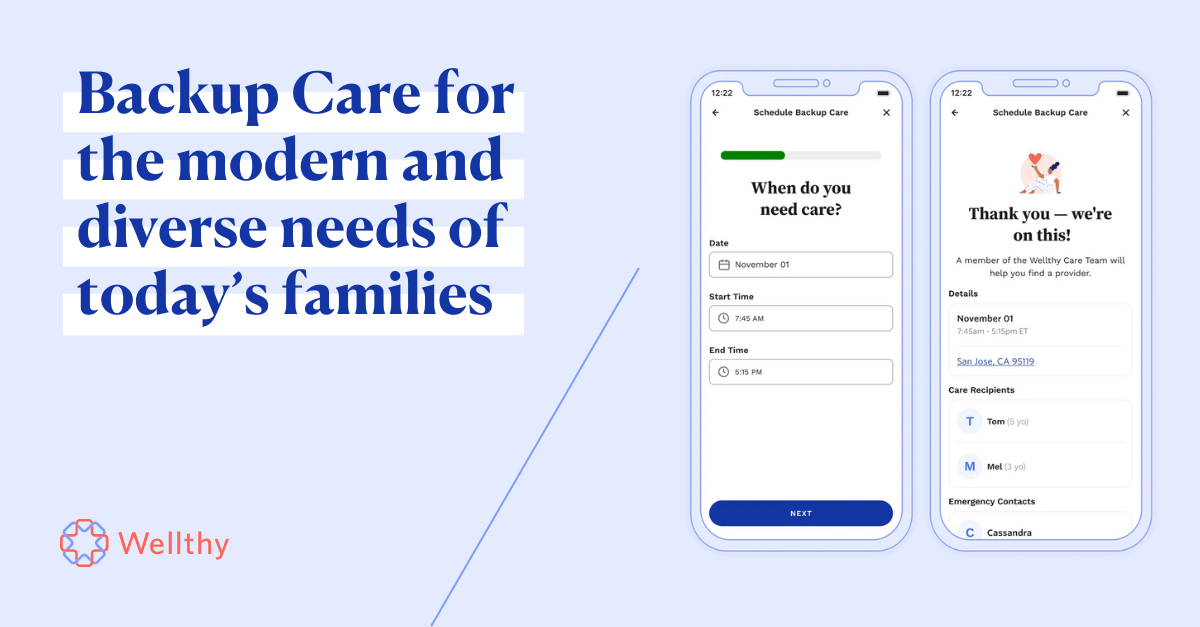As discussing death and the end of life becomes less taboo, end of life doulas are becoming an increasingly popular concept. While Wellthy does not currently offer end of life doula support, many members of Wellthy’s Care Team volunteer outside of work in this capacity and bring their lived experience to their work in supporting families.
We recently interviewed Heather, Cori, and Ashley — three members of Wellthy's Care Team who also volunteer as end of life doulas. They discuss how doulas help families surrounding someone's passing, when families should seek support from a doula, and how to find one.
What do end of life doulas, or “death doulas,” do?
“End of life doulas hold your hand through the process of passing. They guide the person transitioning and their loved ones through the dying process. Think of it like an advocate with experience – a friend who is invested in what you want out of your last days. Some end of life doulas are certified nurse aides who can provide hands-on care (i.e. changing incontinence products, giving morphine), but having a medical background is not a requirement.” – Ashley
How does a doula support the individual passing?
“Doulas are essentially there to help someone pass the way they want — from how they spend their final days, to how they want their family to see their body after passing. I have helped coordinate dance parties, journaled on behalf of individuals so their family has stories preserved, or just played music like The Beatles while they pass. It's a doula's job to talk to them about their wishes and help them make those happen.
After someone passes, the doula cannot call the time of death (this must be done by a coroner or hospice), but they may prepare the body for the family to see it, if that’s what the individual wanted.
Sometimes the individual calls a doula in for ‘dynamic situations,’ like differing religious beliefs among different family members. In these cases, the goal is to bring the focus back to the individual and lower everyone’s stress levels.” – Heather
How does a doula support the family through their loved one’s death?
“A doula’s focus is always on the individual passing, but doulas really impact the family too. Their presence often gives families the peace of mind that they can leave their loved one’s side to take a break, eat a meal, shower, etc. Their worry is eased knowing that if they aren’t in the room, their loved one won’t pass alone. A lot of times I see the person wait until their family members are no longer in the room to pass so they won’t have to see them that way.
Doulas also take on everyday tasks. For example, the person passing might ask their doula to phone certain people once they die. This is a small thing, but brings huge relief to the family members who then don’t have to make those phone calls. Doulas can also do simple things like get takeout and run the laundry.
A big responsibility is educating the family on the process of dying so nothing shocks them. They get to know the family and what level of information they want – some want to know everything about the dying process and some want to know very little.” – Cori
Do doulas work privately, or for other organizations?
“Both. Often families find doulas through their hospice organizations – in this case, the doulas are commonly volunteers, so their ability to commit to serving your loved one is more limited (i.e. they won’t stay overnight).
Hospice and doulas generally have good partnerships. Hospice handles more of the physical and medical needs, whereas doulas can be more personalized and devote more time to the emotions around dying.” – Ashley
How much does it cost to work with an end of life doula?
“If offered through a hospice agency as a service, it’s covered by insurance. Private companies may charge a lot – they are also more likely to be all in on what the family needs, such as around the clock care.” – Cori
Do end of life doulas stay with the person while they pass?
“It depends on what you agree upon. Sometimes there’s a commitment to be there within a certain window of time or overnight if the family calls. Other times they are only there for ad hoc support, to be a companion for the person passing.
Doulas who work for private companies tend to have more flexibility to spend more time with the person passing than doulas who volunteer with hospice organizations. I know one doula who lives with the individual 24/7 until they pass.” – Heather
When should you involve an end of life doula?
“When you know that passing is imminent. The most common time to involve a doula is when someone receives a terminal diagnosis or decides to stop treatment. It often lines up with when hospice becomes involved. Before that point, it may be better to involve a geriatric care manager. I haven't worked with someone for more than 6 months before they passed.” – Heather
Are end of life doula certified individuals?
“There is no certification/regulation board at this time, but end of life doulas have to have experience with death and have taken formal education courses. The education courses keep you updated on advances in the end of life space, like new cremation methods.” – Ashley
How do you find an end of life doula?
“If you have hospice, ask your hospice team – if they don’t have doulas connected to their services, they usually know about local options. The International End of Life Doula Association (INELDA) has a directory of doulas too. To become a member of INELDA, there’s more of a process so every doula in their directory is vetted.Availability does depend on where you live, but the concept of end of life doulas is becoming more popular as fewer people want to die in hospitals or nursing homes.” – Cori
You can learn more about Wellthy's latest service offering on "End of Life and Loss" by clicking here. While Wellthy doesn't offer direct end of life doula' services, our team of care experts (several of whom are end of life doulas) can help families navigate the breadth and depth of logistical and administrative tasks that come with saying goodbye to a loved one — including locating death doulas.







